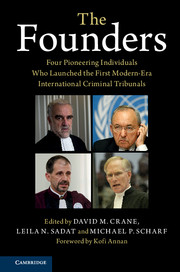 The Founders
The Founders 3 - The Balkan Investigation
from PART I - PUTTING IT ALL IN CONTEXT
Published online by Cambridge University Press: 23 March 2018
Summary
The direct ancestor of the International Criminal Tribunal for the Former Yugoslavia – the institution that confirmed the rebirth of international criminal justice – was the Commission of Experts. Comprised of five members, several of them specialists in international law, the Commission's establishment was mandated by the Security Council. Resolution 780, adopted unanimously on October 6, 1992, was charged with investigating “grave breaches of the Geneva Conventions and other violations of international humanitarian law committed during the conflict in the former Yugoslavia.”
It was the most robust measure that had then been taken by the United Nations in order to deal with a conflict whose beginnings dated back more than a year. The conflict had featured battles and atrocities over a period of several months as Slovenia, and then Croatia, broke away from Yugoslavia to become independent states. The worst of the conflict, in Bosnia and Herzegovina, where the three main ethnic groups were more balanced in numbers and where no single one could claim a majority, was only then getting underway. Desperate but unsuccessful political initiatives to address the crisis had been launched since 1991. But it was only in mid-1992 that the Security Council began to use the language of international criminal justice. In August 1992, it adopted a resolution that said perpetrators “will be individually [held] responsible.”
The August Resolution had been provoked by stunning revelations of atrocities in the Omarska concentration camp. The Resolution referred to “reports of mass forcible expulsion and deportation of civilians, imprisonment and abuse of civilians in detention centres, deliberate attacks on non-combatants, hospitals and ambulances, impeding the delivery of food and medical supplies to the civilian population, and wanton devastation and destruction of property.”
This wasn't the first time international law had turned its attention to the Balkans. One of the very earliest international fact-finding or expert commissions of inquiry was set up in 1913, at the dawn of the First World War. An unofficial body backed by the young Carnegie Endowment, it investigated violations in the conflicts that afflicted the territory of what would later be called “Yugoslavia.” The Commission's report invoked two of the Hague Conventions of 1899 and 1907 as a basis for concluding that war crimes had been perpetrated by various forces in the conflict.
- Type
- Chapter
- Information
- The FoundersFour Pioneering Individuals Who Launched the First Modern-Era International Criminal Tribunals, pp. 44 - 52Publisher: Cambridge University PressPrint publication year: 2018


